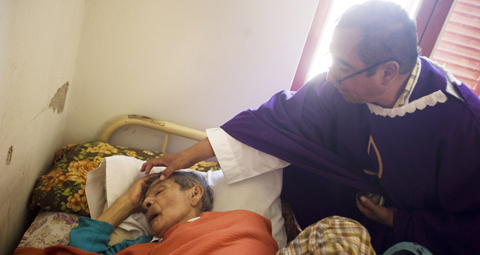October 25 | ![]() 0 COMMENTS
0 COMMENTS ![]() print
print

A truly compassionate society would care for the terminally ill
James Bundy says we should prioritise palliative care, not euthanasia
In preparation for a talk I gave recently on ‘being pro-life in politics,’ I discovered that one of the main reasons people say they are in favour of euthanasia is ‘compassion.’ This initially shocked me but, reflecting on it, I have come to the conclusion that this is because those who are pro-life have struggled at times to show how being pro-life is compassionate.
As a Catholic, I believe our lives are a gift from God. We are His creation, and it is our responsibility to ensure that we follow God’s will. If we are in terrible suffering, but still alive, then God wills for us to be alive.
A non-believer, however, will not be convinced by this argument. As a result, the more secular society has become, the more people favour euthanasia, as they pursue a misguided ‘compassionate’ approach.
Genuine compassion
Those who are pro-euthanasia are authentically trying to be compassionate. Compassion is at the centre of their argument because they are sympathetic to those who are suffering, and ultimately, want to help these people. However, does it really help someone to end his or her life prematurely?
When one is in agony, it is our duty to assist them to ease their pain. This should be no different when an individual faces a terminal illness. We are bound to support these people, particularly if it is a loved one. Unfortunately, the world of globalisation that we live in, and the fixation on GDP, has dramatically reduced the traditional ways in which we as a society care for the elderly and those in need.
The reduced numbers of elderly members of the family living in the family home demonstrates this point. This recent, but radical, change has put great stress on our palliative care system and we must continue to pray for the intentions of those who work in palliative care.
Parliamentary support
Parliaments, both in Holyrood and Westminster, must do more to support these workers. Greater investment in social care, organisational reform, and cross-party solutions are what is needed. These changes are required so that those who are terminally ill get the support they need. It would be wrong to claim that we have compassion at the heart of our society if workers and those in need suffered due to the strains on the system.
The question that I have found myself asking is this: would calls for euthanasia reduce if strains were reduced on the system? If terminally ill people were given the proper care, attention, and love thanks to hard-working carers getting the proper resources they need, what would be more compassionate than that? Loved ones would be in much less pain, but still get to enjoy the many benefits of life.
This is what I believe a compassionate society would look like, and I think it is something we should all aspire to. This vision, however, will only become a reality if people across the country want it to happen.
Taking responsibility
That is why we must take responsibility ourselves. It is us who have to pray for those in social care and assist them when we can. It is us who have to pray for politicians and get in touch with them to voice our concerns. It is us who have to make the arguments in favour of changes to social care and articulate our thoughts to show how they would make a positive difference to the lives of those most in need.
If those who are pro-life do not make the argument for much improved palliative care, it will be very easy for those who are pro-euthanasia to say we are lacking compassion. They would simply say that we want to prolong life without caring about the suffering those who are terminally ill go through.
Yet, by providing solutions to the questions about how we can reduce the pain people suffer—through the increase in quality of social care—we have compassion at the heart of our argument. People could not view us as people who simply want to extend life for religious reasons, but as people who want to help reduce the pain those with terminal illness suffer so they can enjoy life.
First step
This is the first step we must take to place ourselves in a position where people will listen to our voices in a future debate, which I fear will be soon.
But this action isn’t to win a debate. It is to make a positive difference to the thousands, if not millions, of people in our country who are suffering as you read this. It is our responsibility to make sure they get the care, support, attention, and love they need.
This is the argument of compassion as it involves tireless effort from ourselves to put others and their needs first. It is putting a strain on ourselves—financially and in regard to time—to help a loved one. We are designed to celebrate life, and to assist those that need help by doing what we can do to bring comfort to their lives. This is why I am opposed to euthanasia, and proudly declare myself pro-life.










